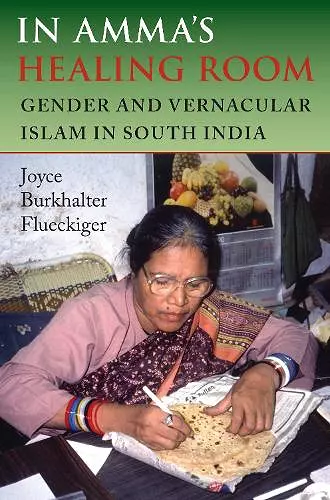In Amma's Healing Room
Gender and Vernacular Islam in South India
Joyce Burkhalter Flueckiger author
Format:Paperback
Publisher:Indiana University Press
Published:26th Apr '06
Currently unavailable, and unfortunately no date known when it will be back

Ethnographic study of a charismatic Muslim woman healer whose practice crosses gender and religious boundaries
"[I]t is extremely salubrious to see the ways Islam works in the lives of ordinary people who are not politicized in their religious lives. . . . No other book on South Asia has material like this." —Ann Grodzins Gold
In Amma's Healing Room is a compelling study of the life and thought of a female Muslim spiritual healer in Hyderabad, South India. Joyce Burkhalter Flueckiger describes Amma's practice as a form of vernacular Islam arising in a particular locality, one in which the boundaries between Islam, Hinduism, and Christianity are fluid. In the "healing room," Amma meets a diverse clientele that includes men and women, Muslim, Hindu, and Christian, of varied social backgrounds, who bring a wide range of physical, social, and psychological afflictions. Flueckiger collaborated closely with Amma and relates to her at different moments as daughter, disciple, and researcher. The result is a work of insight and compassion that challenges widely held views of religion and gender in India and reveals the creativity of a tradition often portrayed by Muslims and non-Muslims alike as singular and monolithic.
. . . [H]er book, like all ethnographies, should also be read between the lines—Flueckiger was concerned that by publishing her material she would bring public attention to forms of Islam criticized by other Muslims; she also analyses very sensitive dimensions of Amma's role as a healer—notably the part she plays in Hindu-Muslim conversion processes. All in all, In Amma's Healing Room is a well-written ethnographic study of a complex and sensitive domain of Muslim religious experience and, as such, is a very welcome addition not only to the expanding body of anthropological work on Islam as a world religion. It broadens the anthropological understanding of the various forms taken by Islamic religious authority and offers new insights into the vitality and diversity of Muslim ritual practices in South Asia.
-- Magnus Marsden * Journal of the Royal Anthropological Institute *This informative study is well illustrated with the author's photographs and immensely suitable for undergraduate and graduate students. . . . Highly recommended.
* Choice *This book is a compelling ethnographic study . . . Flueckiger's work goes a long way towards shattering the categories and fixed identities commonly associated with South Asia. . . . The emphasis on gender makes this work even more invaluable for anyone trying to study religion in South Asia, or indeed, Islam, as a lived experience.V.29.2 July 2009
* South Asia Research *In Amma's Healing Room is a terrific book. Well structured and well written, it will be a great addition to courses on religious ethnography, popular and contemporary Islam, South Asian religions, ritual studies, and gender studies. 88.2, April 2008
* the Journal of Religion *Only rarely are books powerful enough to capture the imaginations and emotions of our students: this is one such book.Vol. 48.1 May 2009
-- Susan Snow Wadley * Syracuse University *. . . In Amma's Healing Room is a well-written ethnographic study of a complex and sensitive domain of Muslim religious experience and, as such, is a very welcome addition not only to the expanding body of anthropological work on Islam as a world religion. It broadens the anthropological understanding of the various forms taken by Islamic religious authority and offers new insights into the vitality and diversity of Muslim ritual practices in South Asia. Vol.15. 1 March 2009
-- Magnus Marsden * School of Oriental and African Studies *. . . This is a timely ethnography . . . in a time in which the high volume of negative religious rhetoric about Islam and in the name of Islam, Hinduism, and Christianity have subsumed the centrality of love in religious teachings and rituals.
* Anthropological QuarterISBN: 9780253218377
Dimensions: unknown
Weight: 513g
320 pages